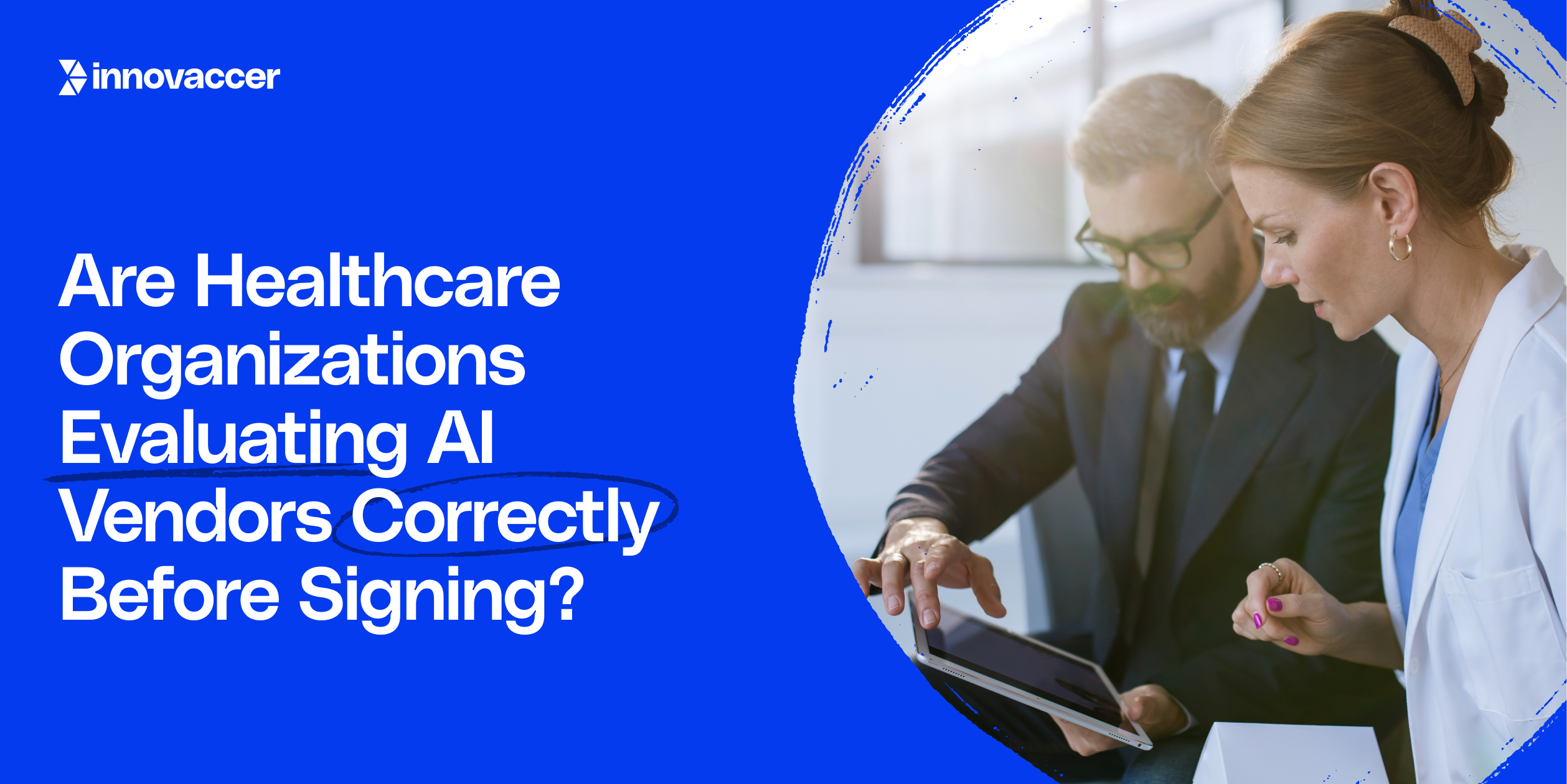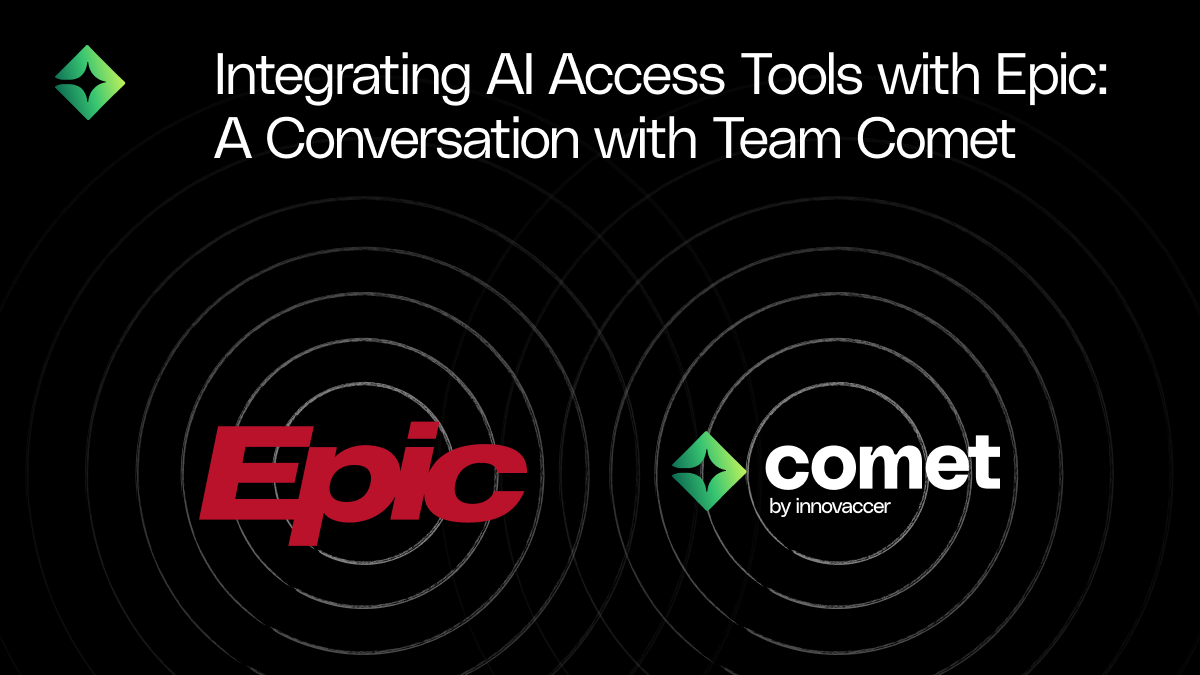Are Healthcare Organizations Evaluating AI Vendors Correctly Before Signing?


The global AI in healthcare market size is expected to grow at a CAGR of 38.5% from 2024 to 2030, driven by the increasing demand for enhanced efficiency, accuracy, and better patient outcomes. With such rapid expansion, the market will see an influx of new entrants and a growing number of organizations specializing in niche AI solutions for the healthcare sector.
Now let’s look at the other side – the users. Among all industries leveraging AI, healthcare’s sensitive nature makes it critical to conduct due diligence on the AI solutions. While AI can enhance core competencies of the hospitals by streamlining multiple workflows, selecting an AI vendor requires careful consideration beyond traditional vendor assessment.
In this article, we’ll dive deep into the different parameters for assessing the AI vendors before integrating them into healthcare operations.
Technical Due Diligence Specific to AI
AI software tends to be far more sophisticated compared to the traditional software, requiring careful evaluation of the underlying technology, algorithms, and data management techniques before adopting the solution for daily operations. This step of due diligence becomes essential for healthcare organizations due to its possible risks and subsequent impact on patient data.
Additionally, AI systems must be transparent about how they generate diagnostic and treatment recommendations. Physicians need clarity on model limitations, confidence levels, and accuracy to make informed decisions. Given the reliance on these solutions, providers must assess their fit and precision before integration.
Healthcare Domain Expertise

Some of the essential capabilities expected in an AI vendor before integrating it into a hospital’s operations include:
- A significant level of healthcare expertise to assist the organization, especially the physicians and the hospital staff.
- Understanding of patient care workflows and standardized coding used by the network, in addition to medical terminology, clinical guidelines and best practices.
- Comprehensive knowledge of major EHR and clinical decision support systems, along with proficiency in healthcare data exchange protocols.
To assess vendors' practical healthcare competency, organizations should use scenario-based workshops, thorough case studies, and a record of all successful deployments in comparable healthcare environments.
Speaking your language, understanding your problems, matching their solution with the clinical objectives and patient care mission of your company are indicators of a vendor with great healthcare domain experience.
Risk Management and Liability
The use of AI in healthcare has significant consequences, as every algorithmic choice directly impacts patient outcomes. Organizations must carefully evaluate how vendors address both clinical and operational risks, particularly concerning algorithmic errors as it could lead to inappropriate clinical recommendations, misdiagnosis or treatment delays.
They need to establish clear lines of liability and responsibility at the time of implementing these AI solutions. Detailed contractual agreements should be developed, specifying accountability for AI-driven decisions especially in high-stake clinical scenarios. Organizations must ensure that the vendors provide a comprehensive professional liability insurance as a precautionary measure in cases of any incidents directly imposing downstream effects on healthcare operations.
Performance Monitoring and SLAs
Healthcare organizations must establish comprehensive Service Level Agreements (SLAs) which provide detailed knowledge about the service to be provided and the level of performance that should be expected from the vendor. These SLAs should specify not just system availability as needed but also different clinical performance metrics such as diagnostic accuracy rates, maximum acceptable latency for emergency cases, and sensitivity thresholds for different medical conditions.

The organization must undergo performance monitoring for the AI vendor focusing on robust clinical validation metrics across diverse patient populations and scenarios, with regular audits and independent verification capabilities. The agreements should also mandate periodic system optimization, model retraining, and updates to maintain effectiveness as medical practices evolve. This would help pave way for a smoother working relationship.
Training and Support
Once the AI vendor relationship is established, the organizations and the vendors need to prepare the healthcare staff to interact with the system and adopt the technology into their day-to-day activities across all roles.
- The vendor should provide role-based training programs that not only cover technical aspects but also integrate clinical context and decision-making protocols.
- Support must be provided through different channels with guaranteed response times like chatbots, service representatives, and a specialized point of contact requiring immediate attention based on urgency levels.
- While implementing the system, regular check-ins will enable a smoother transition, along with comprehensive documentation, quick reference guides, and updated training materials.
This collaborative approach will ensure that the training and support evolve with the organization's needs and will help maintain high levels of user adoption and confidence in the AI system.
Conclusion
As healthcare organizations consider these comprehensive evaluation criteria for AI vendors, we need to remember that the stakes in healthcare are particularly high. Any healthcare organization needs to conduct thorough due diligence in onboarding a vendor, with careful consideration of both traditional vendor management aspects and AI-specific concerns. These detailed checks and analysis would provide maximum value for the AI investment, leading to proper regulatory compliance, ensuring patient safety and maintaining the quality of care your organization provides. To see how Innovaccer’s solution meets these rigorous standards and can enhance your healthcare operations, schedule a demo today.


.png)






.avif)









.svg)
.svg)

.svg)

